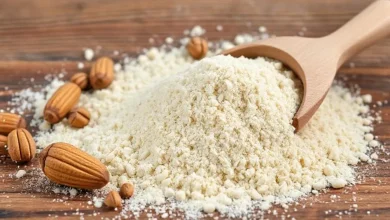Food Ingredient: Dock, Cooked, Blended, Dried with Salt
Dock, often known for its distinctive tangy flavor, has been carefully prepared by cooking, blending, and drying, and is seasoned with salt to enhance its savory profile. This ingredient offers a burst of nutrients, making it a versatile addition to a variety of dishes, from soups and stews to salads and side dishes.
Nutritional Information
Here’s a breakdown of the nutritional values for a standard serving of dock, cooked, blended, and dried with salt:
| Nutrient | Amount per 100g |
|---|---|
| Energy | 20.0 kcal |
| Protein | 1.83 g |
| Total Fat | 0.64 g |
| Saturated Fat | 0.0 g |
| Carbohydrates | 2.93 g |
| Fiber | 0.0 g |
| Sugars | 0.0 g |
| Calcium | 38.0 mg |
| Iron | 2.08 mg |
| Magnesium | 89.0 mg |
| Phosphorus | 52.0 mg |
| Potassium | 321.0 mg |
| Sodium | 239.0 mg |
| Zinc | 0.17 mg |
| Copper | 0.114 mcg |
| Manganese | 0.303 mg |
| Selenium | 0.9 mcg |
| Vitamin C | 26.3 mg |
| Thiamin (B1) | 0.034 mg |
| Riboflavin (B2) | 0.086 mg |
| Niacin (B3) | 0.411 mg |
| Vitamin B6 | 0.1 mg |
| Folate (B9) | 8.0 mcg |
| Vitamin B12 | 0.0 mcg |
| Vitamin A | 174.0 mcg |
| Vitamin E | 0.0 mg |
| Vitamin D2 | 0.0 mcg |
Health Benefits
Dock, especially in its cooked, blended, and dried form, is a rich source of essential vitamins and minerals. The combination of potassium and magnesium can support proper muscle function and overall hydration balance. The significant amount of iron aids in red blood cell production, while calcium and phosphorus contribute to bone health. Dock also offers a good dose of vitamin A, crucial for maintaining healthy vision and skin.
In addition, the high levels of vitamin C provide antioxidant properties, which help in immune function and tissue repair. With modest amounts of folate and B vitamins (thiamin, riboflavin, niacin, and B6), dock supports energy metabolism, brain function, and the synthesis of red blood cells.
Dietary Considerations
Dock is suitable for a variety of dietary preferences, especially those seeking a nutrient-dense, low-calorie food. While it contains a small amount of fat, the absence of saturated fats makes it heart-healthy. Those following low-sodium or sodium-sensitive diets should keep in mind that dock contains a moderate amount of sodium. However, for most, it can be a valuable addition to a balanced diet.
This ingredient is naturally gluten-free, and free from common allergens such as dairy, nuts, and eggs, making it an excellent choice for those with allergies or sensitivities.
Culinary Use & Tips
Dock, cooked and dried with salt, is incredibly versatile. It can be used in a range of dishes from savory stews to grain-based salads or as a garnish for various meat dishes. Its mild yet slightly tangy flavor adds depth to a meal without overwhelming other ingredients.
As a dried product, it can be rehydrated by soaking in warm water or added directly to soups, where it will reabsorb moisture as it cooks. You can also use it as a flavor enhancer, similar to a spice blend, by sprinkling it over roasted vegetables or pasta dishes.
Conclusion
Dock, in its cooked, blended, and dried form with salt, provides not only a flavorful ingredient but also a substantial nutritional boost to your meals. Its array of essential vitamins and minerals, including vitamin A, C, iron, and magnesium, makes it a smart choice for a healthy, balanced diet. Whether you’re looking to add some variety to your vegetable repertoire or need an easy-to-use ingredient for your next culinary adventure, dock offers both taste and nutrition in one package.










